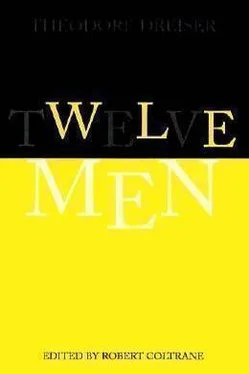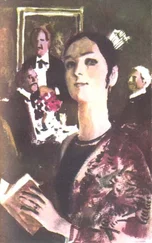Теодор Драйзер - Twelve Men
Здесь есть возможность читать онлайн «Теодор Драйзер - Twelve Men» весь текст электронной книги совершенно бесплатно (целиком полную версию без сокращений). В некоторых случаях можно слушать аудио, скачать через торрент в формате fb2 и присутствует краткое содержание. Год выпуска: 2014, Издательство: epubBooks Classics, Жанр: Биографии и Мемуары, на английском языке. Описание произведения, (предисловие) а так же отзывы посетителей доступны на портале библиотеки ЛибКат.
- Название:Twelve Men
- Автор:
- Издательство:epubBooks Classics
- Жанр:
- Год:2014
- ISBN:нет данных
- Рейтинг книги:4 / 5. Голосов: 1
-
Избранное:Добавить в избранное
- Отзывы:
-
Ваша оценка:
- 80
- 1
- 2
- 3
- 4
- 5
Twelve Men: краткое содержание, описание и аннотация
Предлагаем к чтению аннотацию, описание, краткое содержание или предисловие (зависит от того, что написал сам автор книги «Twelve Men»). Если вы не нашли необходимую информацию о книге — напишите в комментариях, мы постараемся отыскать её.
Twelve Men — читать онлайн бесплатно полную книгу (весь текст) целиком
Ниже представлен текст книги, разбитый по страницам. Система сохранения места последней прочитанной страницы, позволяет с удобством читать онлайн бесплатно книгу «Twelve Men», без необходимости каждый раз заново искать на чём Вы остановились. Поставьте закладку, и сможете в любой момент перейти на страницу, на которой закончили чтение.
Интервал:
Закладка:
In the little town where he had lived so many years, and where he finally died, he knew every living creature from cattle upwards, and could call each by name. The sick, the poor, the widows, the orphans, the insane, and dependents of all kinds, were his especial care. Every Sunday afternoon for years, it was his custom to go the rounds of the indigent, frequently carrying a basket of his good wife's dinner. This he distributed, along with consolation and advice. Occasionally he would return home of a winter's day very much engrossed with the discovery of some condition of distress hitherto unseen.
"Mother," he would say to his wife in that same oratorical manner previously noted, as he entered the house, "I've found such a poor family. They have moved into the old saloon below Solmson's. You know how open that is." This was delivered in the most dramatic style after he had indicated something important by throwing his overcoat on the bed and standing his cane in the corner. "There's a man and several children there. The mother is dead. They were on their way to Kansas, but it got so cold they've had to stop here until the winter is broken. They're without food; almost no clothing. Can't we find something for them?"
"On these occasions," said his daughter to me once, "he would, as he nearly always did, talk to himself on the way, as if he were discussing politics. But you could never tell what he was coming for."
Then with his own labor he would help his wife seek out the odds and ends that could be spared, and so armed, would return, arguing by the way as if an errand of mercy were the last thing he contemplated. Nearly always the subject of these orations was some public wrong or error which should receive, although in all likelihood it did not, immediate attention.
Always of a reverent, although not exactly religious, turn of mind, he took considerable interest in religious ministration, though he steadily and persistently refused, in his later years, to go to church. He had St. James's formula to quote in self–defense, which insists that "Pure religion and undefiled before our God and Father is this, To visit the fatherless and widows in their affliction, and to keep himself unspotted from the world." Often, when pressed too close, he would deliver this with kindly violence. One of the most touching anecdotes representative of this was related to me by his daughter, who said:
"Mr. Kent, a poor man of our town, was sick for months previous to his death, and my father used to go often, sometimes daily, to visit him. He would spend perhaps a few minutes, perhaps an hour, with him, singing, praying, and ministering to his spiritual wants. The pastor of the church living so far away and coming only once a month, this duty devolved upon some one, and my father did his share, and always felt more than repaid for the time spent by the gratitude shown by the many poor people he aided in this way.
"Mr. Kent's favorite song, for instance, was 'On Jordan's Stormy Banks I Stand.' This he would have my father sing, and his clear voice could often be heard in the latter's small house, and seemed to impart strength to the sick man.
"Upon one occasion, I remember, Mr. Kent expressed a desire to hear a certain song. My father was not very familiar with it but, anxious to grant his request, came home and asked me if I would get a friend of mine and go and sing the song for him.
"We entered the sick–room, he leading us by the hand, for we were children at the time. Mr. Kent's face at once brightened, and father said to him:
"'Mr. Kent, I told you this morning that I couldn't sing the song you asked for, but these girls know it, and have come to sing it for you.'
"Then, waving his hand gently toward us, he said:
"'Sing, children.'
"We did so, and when we had finished he knelt and offered a prayer, not for the poor man's recovery but that he might put his trust in the Lord and meet death without fear. I have never been more deeply impressed nor felt more confident in the presence of death, for the man died soon after, soothed into perfect peace."
On another occasion he was sitting with some friends in front of the courthouse in his town, talking and sunning himself, when a neighbor came running up in great excitement, calling:
"Mr. White, Mr. White, come, right quick. Mrs. Sadler wants you."
He explained that the woman in question was dying, and, being afraid she would strangle in her last moments, had asked the bystanders to run for him, her old acquaintance, in the efficacy of whose prayers she had great faith. The old patriarch was without a coat at the time, but, unmindful of that, hastened after.
"Mr. White," exclaimed the sick woman excitedly upon seeing him, "I want you to pray that I won't strangle. I'm not afraid to die, but I don't want to die that way. I want you to offer a prayer for me that I may be saved from that. I'm so afraid."
Seeing by the woman's manner that she was very much overwrought, he used all his art to soothe her.
"Have no fear, Mrs. Sadler, now," he exclaimed solemnly. "You won't strangle. I will ask the Lord for you, and this evil will not come upon you. You need not have any fear."
"Kneel down, you," he commanded, turning upon the assembled neighbors and relatives who had followed or had been there before him, while he pushed back his white hair from his forehead. "Let us now pray that this good woman here be allowed to pass away in peace." And even with the rustle of kneeling that accompanied his words he lifted up his coatless arms and began to pray.
Through his magnificent phraseology, no doubt, as well as his profound faith, he succeeded in inducing a feeling of peace and quiet in all his hearers, the sick woman included, who, listening, sank into a restful stupor, from which all agony of mind had apparently disappeared. Then when the physical atmosphere of the room had been thus reorganized, he ceased and retired to the yard in front of the house, where on a bench under a shade tree he seated himself to wipe his moist brow and recover his composure. In a few moments a slight commotion in the sick–room denoted that the end had come. Several neighbors came out, and one said, "Well, it is all over, Mr. White. She is dead."
"Yes," he replied with great assurance. "She didn't strangle, did she?"
"No," said the other, "the Lord granted her request."
"I knew He would," he replied in his customary loud and confident tone. "Prayer is always answered."
Then, after viewing the dead woman and making additional comments, he was off, as placid as though nothing had occurred.
I happened to hear of this some time after, and one day, while sitting with him on his front porch, said, "Mr. White, do you really believe that the Lord directly answered your prayer in that instance?"
"Answered!" he almost shouted defiantly and yet with a kind of human tenderness that one could never mistake. "Of course He answered! Why wouldn't He—a faithful old servant like that? To be sure, He answered."
"Might it not have been merely the change of atmosphere which your voice and strength introduced? The quality of your own thoughts goes for something in such matters. Mind acts on mind."
"Certainly," he said, in a manner as agreeable as if it had always been a doctrine with him. "I know that. But, after all, what is that —my mind, your mind, the sound of voices? It's all the Lord anyhow, whatever you think."
How could one gainsay such a religionist as that?
The poor, the blind, the insane, and sufferers of all sorts, as I have said before, were always objects of his keenest sympathies. Evidence of it flashed out at the most unexpected moments—loud, rough exclamations, which, however, always contained a note so tender and suggestive as to defy translation. Thus, while we were sitting on his front porch one day and hotly discussing politics to while away a dull afternoon, there came down the street, past his home, a queer, ragged, half–demented individual, who gazed about in an aimless sort of way, peering queerly over fences, looking idly down the road, staring strangely overhead into the blue. It was apparent, in a moment, that the man was crazy, some demented creature, harmless enough, however, to be allowed abroad and so save the county the expense of caring for him. The old man broke a sentence short in order to point and shake his head emotionally.
Читать дальшеИнтервал:
Закладка:
Похожие книги на «Twelve Men»
Представляем Вашему вниманию похожие книги на «Twelve Men» списком для выбора. Мы отобрали схожую по названию и смыслу литературу в надежде предоставить читателям больше вариантов отыскать новые, интересные, ещё непрочитанные произведения.
Обсуждение, отзывы о книге «Twelve Men» и просто собственные мнения читателей. Оставьте ваши комментарии, напишите, что Вы думаете о произведении, его смысле или главных героях. Укажите что конкретно понравилось, а что нет, и почему Вы так считаете.









